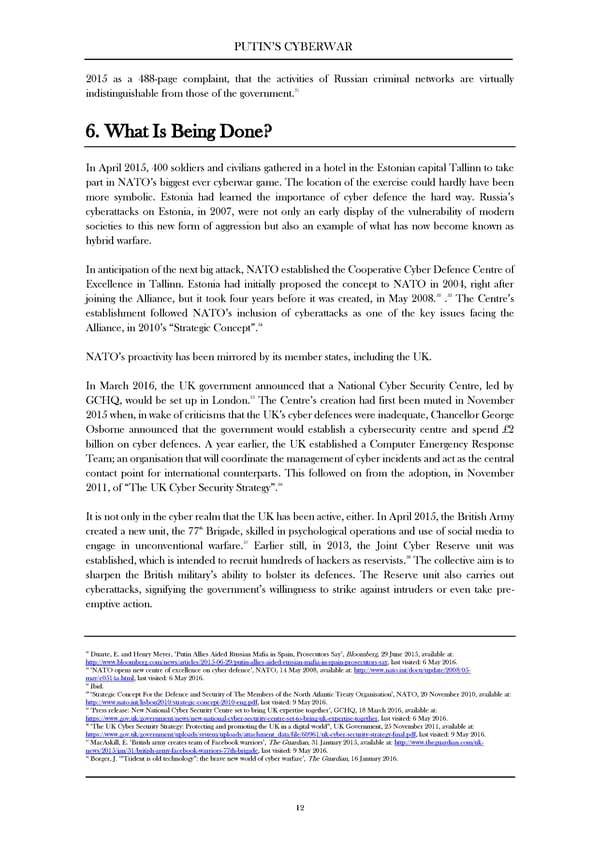PUTIN’S CYBERWAR 2015 as a 488-page complaint, that the activities of Russian criminal networks are virtually indistinguishable from those of the government.51 6. What Is Being Done? In April 2015, 400 soldiers and civilians gathered in a hotel in the Estonian capital Tallinn to take part in NATO’s biggest ever cyberwar game. The location of the exercise could hardly have been more symbolic. Estonia had learned the importance of cyber defence the hard way. Russia’s cyberattacks on Estonia, in 2007, were not only an early display of the vulnerability of modern societies to this new form of aggression but also an example of what has now become known as hybrid warfare. In anticipation of the next big attack, NATO established the Cooperative Cyber Defence Centre of Excellence in Tallinn. Estonia had initially proposed the concept to NATO in 2004, right after 52 53 joining the Alliance, but it took four years before it was created, in May 2008. . The Centre’s establishment followed NATO’s inclusion of cyberattacks as one of the key issues facing the 54 Alliance, in 2010’s “Strategic Concept”. NATO’s proactivity has been mirrored by its member states, including the UK. In March 2016, the UK government announced that a National Cyber Security Centre, led by 55 GCHQ, would be set up in London. The Centre’s creation had first been muted in November 2015 when, in wake of criticisms that the UK’s cyber defences were inadequate, Chancellor George Osborne announced that the government would establish a cybersecurity centre and spend £2 billion on cyber defences. A year earlier, the UK established a Computer Emergency Response Team; an organisation that will coordinate the management of cyber incidents and act as the central contact point for international counterparts. This followed on from the adoption, in November 56 2011, of “The UK Cyber Security Strategy”. It is not only in the cyber realm that the UK has been active, either. In April 2015, the British Army th created a new unit, the 77 Brigade, skilled in psychological operations and use of social media to 57 engage in unconventional warfare. Earlier still, in 2013, the Joint Cyber Reserve unit was 58 established, which is intended to recruit hundreds of hackers as reservists. The collective aim is to sharpen the British military’s ability to bolster its defences. The Reserve unit also carries out cyberattacks, signifying the government’s willingness to strike against intruders or even take pre- emptive action. 51 Duarte, E. and Henry Meyer, ‘Putin Allies Aided Russian Mafia in Spain, Prosecutors Say’, Bloomberg, 29 June 2015, available at: http://www.bloomberg.com/news/articles/2015-06-29/putin-allies-aided-russian-mafia-in-spain-prosecutors-say, last visited: 6 May 2016. 52 ‘NATO opens new centre of excellence on cyber defence’, NATO, 14 May 2008, available at: http://www.nato.int/docu/update/2008/05- may/e0514a.html, last visited: 6 May 2016. 53 Ibid. 54 ‘Strategic Concept For the Defence and Security of The Members of the North Atlantic Treaty Organisation’, NATO, 20 November 2010, available at: http://www.nato.int/lisbon2010/strategic-concept-2010-eng.pdf, last visited: 9 May 2016. 55 ‘Press release: New National Cyber Security Centre set to bring UK expertise together’, GCHQ, 18 March 2016, available at: https://www.gov.uk/government/news/new-national-cyber-security-centre-set-to-bring-uk-expertise-together, last visited: 6 May 2016. 56 ‘The UK Cyber Security Strategy: Protecting and promoting the UK in a digital world”, UK Government, 25 November 2011, available at: https://www.gov.uk/government/uploads/system/uploads/attachment_data/file/60961/uk-cyber-security-strategy-final.pdf, last visited: 9 May 2016. 57 MacAskill, E. ‘British army creates team of Facebook warriors’, The Guardian, 31 January 2015, available at: http://www.theguardian.com/uk- news/2015/jan/31/british-army-facebook-warriors-77th-brigade, last visited: 9 May 2016. 58 Borger, J. ‘“Trident is old technology”: the brave new world of cyber warfare’, The Guardian, 16 January 2016. 12
 Putin's Cyberwar Page 14 Page 16
Putin's Cyberwar Page 14 Page 16